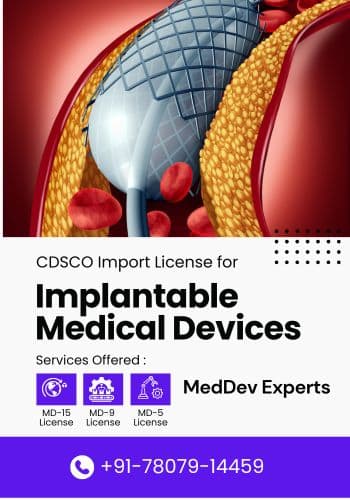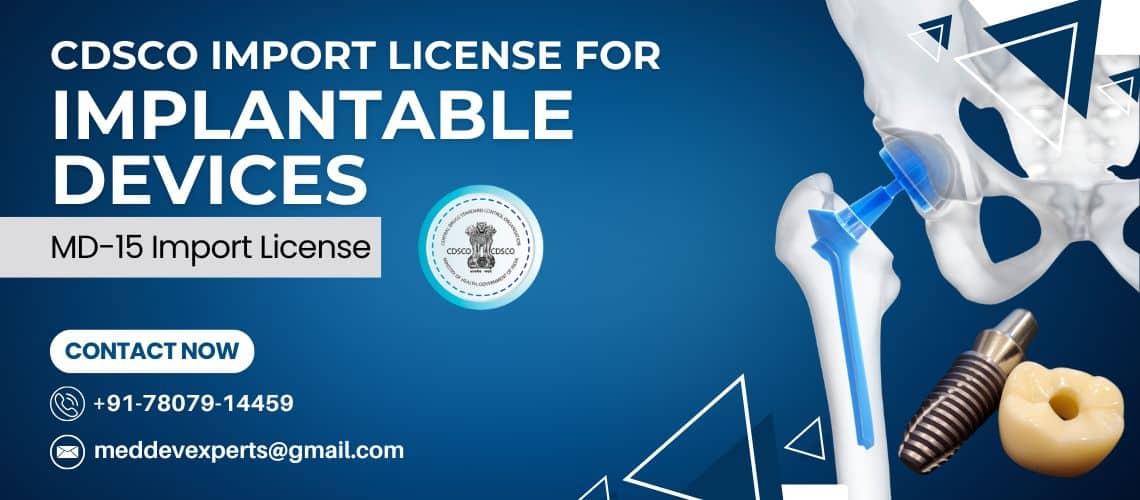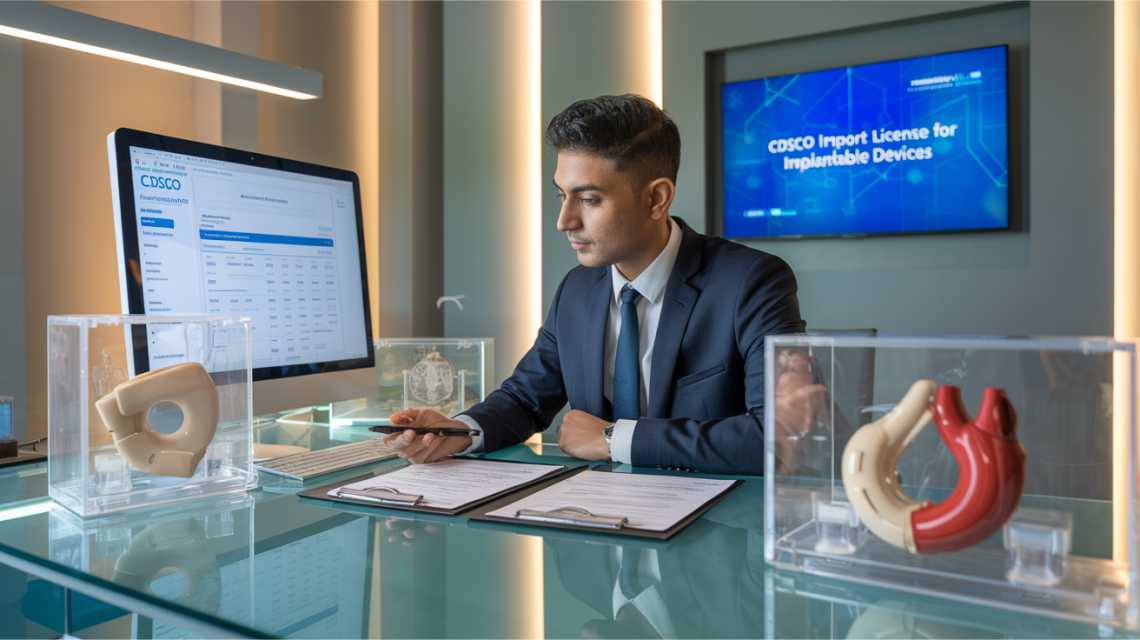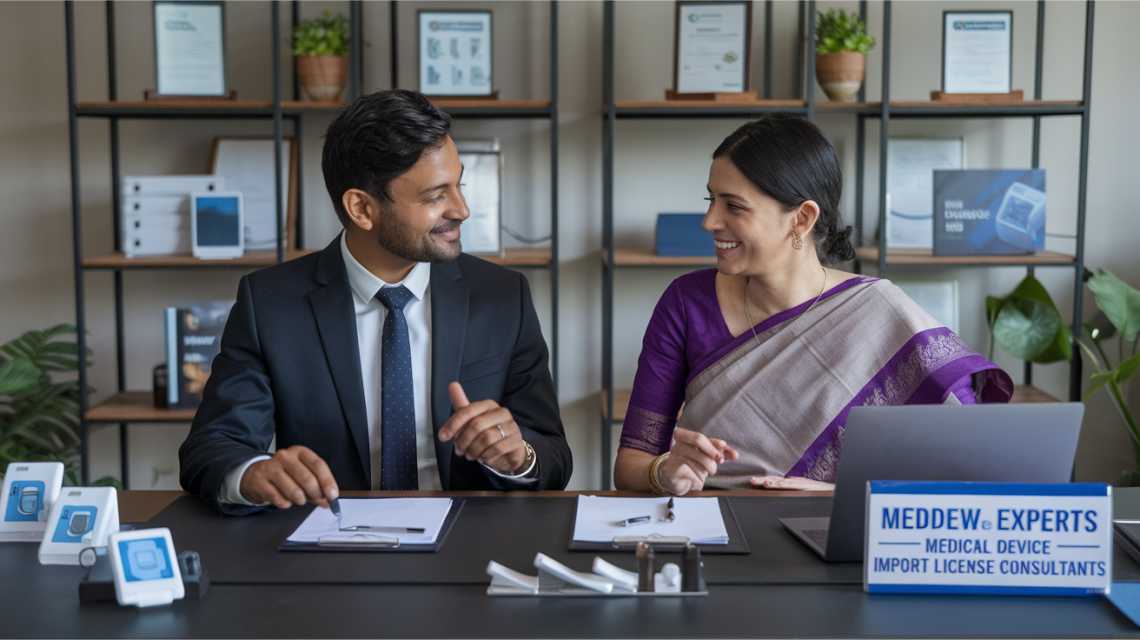CDSCO Import License for Implantable Medical Devices
Navigating India’s regulatory landscape for Import License for Implantable Medical Devices can be a complex journey, especially with mandatory registration requirements under the Medical Device Rules 2017. As the April 1, 2021 implementation deadline has passed, manufacturers and importers must now comply with stringent CDSCO regulations or risk suspension of their import privileges. But what exactly does this process entail, and how can you ensure seamless compliance?
The implications of non-compliance are significant – delayed customs clearance, denied market access, and potential legal consequences that could impact your business growth in India’s thriving medical device market. Whether you’re seeking an Import License for Implantable Medical Devices (MD-15 license) or wondering about documentation requirements, understanding the step-by-step application process is crucial for success.
In this comprehensive guide, we’ll walk you through the entire CDSCO Import License for Implantable Medical Devices – from understanding regulatory requirements and documentation needs to navigating compliance considerations effectively. We’ll also explore how specialized consultants can streamline your application journey, helping you avoid common pitfalls while ensuring your medical devices reach the Indian market without unnecessary delays.
Understanding CDSCO Import License for Implantable Medical Devices
A. Overview of Medical Device Rules 2017
The Medical Device Rules 2017 completely transformed how India regulates medical devices, especially implantables. Before these rules kicked in, most medical devices were regulated as drugs.
The MDR 2017 created a dedicated framework specifically for medical devices that:
- Categorizes devices into four risk classes (A through D)
- Establishes clear manufacturing standards
- Creates a streamlined import pathway
- Sets up post-market surveillance requirements
For importers of implantable devices, these rules mean you now need to deal with proper documentation, quality management systems, and clinical evidence requirements that actually make sense for devices rather than pharmaceuticals.
B. Mandatory Registration Requirements (Effective April 1, 2021)
Got an implantable device you want to bring to India? Since April 1, 2021, you absolutely must register it with CDSCO. No registration, no import – it’s that simple.
The registration process includes:
Submitting detailed product specifications
Providing free sale certificates from country of origin
Demonstrating compliance with essential principles
This isn’t just bureaucratic red tape. The registration system creates transparency and ensures only properly vetted implantable devices reach Indian patients.
C. Classification of Implantable Medical Devices
Implantable devices almost always fall into the highest risk categories (Class C or D) because they’re literally going inside someone’s body for extended periods.
Here’s a quick breakdown:
Class C: Medium-high risk (temporary implants, absorbable sutures)
Class D: High risk (permanent implants like pacemakers, heart valves)
The classification determines everything from documentation requirements to clinical data needed to import approval timelines.
D. Regulatory Bodies Involved (DCGI and CDSCO)
Two key players control your implantable device’s entry into India:
The Drug Controller General of India (DCGI) is the final authority who signs off on Import License for Implantable Medical Devices. Think of them as the gatekeeper you need to impress.
The Central Drugs Standard Control Organization (CDSCO) handles the day-to-day processing, technical reviews, and recommendations for approval. They’re the ones scrutinizing your documentation.
Working with both effectively means understanding their distinct roles and submission requirements, especially their concerns about safety for implantable devices.
Step-by-Step Process for Obtaining an Import License for Implantable Medical Devices
Now that you understand the regulations of CDSCO Import License for Implantable Medical Devices, let’s dive into the practical steps needed to obtain your import license.
A. Registration of Applicant on the CDSCO Portal
The first step in obtaining an import license for implantable medical devices (MD-15 License) is registering on the CDSCO SUGAM portal. This online platform streamlines the application process and ensures a paperless workflow. To register:
- Visit the official CDSCO SUGAM portal
- Create a new account with your business details
- Complete the verification process
- Access your dashboard to begin the application process
Registration on the portal is mandatory as CDSCO has implemented SUGAM, a paperless processing system to enhance efficiency and transparency in the application process.
B. Preparation and Submission of Form MD-14 Application
After successful registration, you’ll need to prepare and submit the Form MD-14 application:
Complete all required fields in Form MD-14, including:
- Company information and contact details
- Product specifications of the implantable devices
- Manufacturing facility information
- Regulatory approvals from other jurisdictions (especially GHTF countries)
- Quality assurance documentation
Prepare supporting documents based on device classification:
Predicate Table (comparing your device to similar approved devices)
Submit the application along with the prescribed fees, which vary based on application type and other factors.
C. Application Review and Approval Procedures
Once submitted, your application undergoes a thorough review process:
Initial Screening: CDSCO officials conduct a preliminary review to ensure all documentation is complete.
Technical Evaluation: The Drug Controller General of India (DCGI) and relevant committees evaluate the application for compliance with safety and efficacy standards.
Inspection Process: CDSCO may conduct inspections of manufacturing facilities to verify compliance with Good Manufacturing Practices (GMP).
Approval Decision: Based on the evaluation, CDSCO either approves, requests additional information, or rejects the application.
License Issuance: Upon approval, the MD-15 Import License is issued, typically valid for five years.
The processing time varies from weeks to months depending on application completeness and CDSCO’s current workload.
With your import license application submitted and under review, you’ll need to prepare the key documentation and requirements for the import license, which we’ll cover in the next section.
Key Documentation and Requirements for Import License for Implantable Medical Devices
Risk-Based Classification of Medical Devices
Now that we’ve examined the step-by-step application process, understanding the specific documentation requirements based on device classification is crucial for a successful CDSCO import license application. The Central Drugs Standard Control Organization categorizes medical devices into four risk-based classes:
Class A: Low risk
Class B: Low-moderate risk
Class C: Moderate-high risk
Class D: High risk (including most implantable devices)
This classification significantly influences the regulatory requirements and documentation needed for market entry in India.
The Device Master File is a cornerstone document containing:
Design information and specifications
Intended use and target patient population
Materials used in device construction
Clinical evaluation data (especially critical for implantable devices)
Testing and validation reports
The PMF must detail the manufacturing facility with:
- Location details and physical address
- Layout specifications including floor plans
- Manufacturing processes documentation
- Quality control measures and systems
- Temperature and humidity control specifications
- Storage conditions validation
Quality Management System Documentation
ISO 13485:2016 certification (mandatory)
Recent QMS audit reports
Declaration of Conformity to applicable standards
Clinical and Risk Documentation
- Clinical Evaluation Report demonstrating safety and performance
- Risk Management Report complying with ISO 14971
- Performance Evaluation Report (for applicable devices)
Authorization and Compliance Documents
Power of Attorney from the foreign manufacturer
Free Sale Certificate from the country of origin
Valid manufacturing license from the country of origin
CE Certificate or equivalent international certification
Properly completed Form MD-14 (for application submission)
Documentation Specific to Implantable Devices
Implantable medical devices, due to their high-risk classification, require additional specialized documentation:
- Comprehensive biocompatibility data according to ISO 10993
- Detailed sterilization validation reports
- Stability data demonstrating long-term performance
- Post-market surveillance plan
- Specialized clinical evidence supporting safety for long-term implantation
- Material characterization and degradation studies (for biodegradable implants)
Documentation Submission Process
All documentation must be submitted via the CDSCO’s online Sugam portal with appropriate fees based on device classification:
| Class of Device | Fee Per Site | Fee per Device |
|---|---|---|
| A (Non-Sterile & Non-Measuring Devices) | Free | Free |
| A | $ 1000 | $ 50 |
| B | $ 2000 | $ 1000 |
| C | $ 3000 | $ 1500 |
| D | $ 3000 | $ 1500 |
Understanding these comprehensive documentation requirements is essential before proceeding to consider the legal implications and compliance considerations that will affect your import license application and ongoing medical device distribution in India.
Legal Implications and Compliance Considerations
Having addressed the essential documentation requirements for importing implantable medical devices, it’s equally important to understand the legal framework and compliance obligations that accompany the CDSCO import license process.
A. License Validity Period and Renewal Process
The MD-15 import license for implantable medical devices typically has a validity period of 5 years. Importers must be vigilant about renewal timelines, as operating with an expired license can lead to regulatory violations. The renewal process should be initiated 90 days before the expiration date to ensure continuous compliance.
B. Exclusivity of MD-15 License to Original Importer
Import licenses for implantable medical devices are granted exclusively to the original applicant. CDSCO designates the approved license holder as the sole entity authorized to import the specified devices. This exclusivity ensures accountability and prevents unauthorized distribution channels, maintaining the integrity of the supply chain for these critical medical products.
C. Consequences of Non-compliance and Deadline Violations
Non-compliance with CDSCO import regulations can result in severe consequences. Violations may lead to import detentions, license suspensions, or revocations. Failing to meet regulatory deadlines or submitting incomplete documentation can significantly delay the approval process or result in application rejection.
D. Post-Import Regulatory Obligations
After successfully importing implantable devices, importers face ongoing regulatory responsibilities. Importers must monitor and report adverse events or device malfunctions to CDSCO. Quality system compliance must be maintained throughout the product lifecycle, with potential post-market inspections to verify adherence to standards. Additionally, importers must ensure proper labeling and documentation accompanies all distributed products, reflecting the device’s approved intended use and safety information.
With these legal implications and compliance considerations in mind, let’s explore how to effectively navigate the CDSCO import license process to ensure successful and efficient approval of your implantable medical device imports.
Navigating the CDSCO Import License for Implantable Medical DevicesProcess Effectively
Having explored the legal and compliance aspects of CDSCO regulations, it’s equally important to understand how to navigate the process of Import License for Implantable Medical Devices efficiently.
A. Common Challenges and Solutions
The CDSCO Import License for Implantable Medical Devices process presents several challenges for medical device importers. Applicants often struggle with coordinating documentation across multiple administrative divisions, including the Zonal and Sub-Zonal Offices spread across India.
A practical solution is to thoroughly research the specific requirements for implantable devices and maintain open communication channels with the relevant CDSCO offices. Utilizing the newly implemented paperless processing systems can significantly streamline documentation submission and reduce processing delays.
B. Role of Regulatory Consultants in Facilitating Approval
MedDev Experts as a regulatory consultants play a crucial role in navigating the CDSCO approval process. With our specialized knowledge of the organizational structure and regulatory requirements, consultants can guide importers through the complex review processes. We provide valuable assistance in preparing documentation that aligns with current guidelines, particularly for implantable medical devices which face heightened scrutiny.
MedDev Experts can also help interpret the various notices and guidelines released by CDSCO, ensuring applications reflect the most current regulatory standards. Their expertise becomes particularly valuable when addressing queries from the Grievances Redressal Officer or other CDSCO officials.
C. Strategic Approaches to Expedite the Licensing Process
To expedite the licensing process, importers should adopt a strategic approach focusing on transparency and compliance. This includes:
- Submitting complete documentation that addresses all requirements of the relevant committees
- Utilizing the SUGAM platform for paperless processing
- Maintaining regular follow-ups with the appropriate Zonal or Sub-Zonal offices
- Reviewing relevant meeting minutes published by CDSCO to understand current approval trends
- Preparing thorough responses to potential queries based on previous public notices
MedDev Experts, a dedicated medical device import license consultant in India
Your Strategic Partner for Import Success
Navigating the complex CDSCO import process for implantable medical devices can feel like trying to solve a puzzle with missing pieces. That’s where MedDev Experts steps in as your dedicated guide.
We’re not just consultants—we’re specialists who eat, sleep, and breathe medical device regulations in India. Our team has successfully handled hundreds of import license applications for implantable devices, from cardiac stents to orthopedic implants.
Why Companies Choose Us
What makes us different? Simple—we understand both the technical aspects of medical devices AND the regulatory maze. When you’re dealing with life-saving implantables, there’s zero room for errors or delays.
Our clients typically secure their import licenses 30% faster than those navigating the process alone. We’ve built relationships with CDSCO officials over years of professional interaction, allowing us to anticipate potential roadblocks before they become problems.
We don’t just fill out forms. Our service includes:
Document preparation with meticulous attention to detail
Strategic advice on classification and compliance requirements
Real-time application tracking and status updates
Direct communication with regulatory authorities
Post-approval support for shipment clearance
When you’re bringing critical implantable devices to Indian patients, partnering with experts isn’t just convenient—it’s essential. We ensure your life-changing technologies reach the market without unnecessary delays.
Navigating CDSCO’s import license for implantable medical devices requires meticulous attention to detail and thorough regulatory compliance. Throughout this guide, we’ve outlined the essential steps from understanding CDSCO regulations to completing the application process, gathering required documentation, and ensuring legal compliance. The transition to mandatory registration under Medical Device Rules 2017 underscores the government’s commitment to ensuring quality and safety of medical devices in India.
For manufacturers and importers looking to enter the Indian market, professional guidance can significantly streamline this complex process. MedDev Experts offers specialized consultancy services to help you navigate the regulatory landscape efficiently, preventing costly delays and compliance issues. With proper preparation and expert assistance, securing your Import License for Implantable Medical Devices becomes a manageable process rather than an overwhelming obstacle, ultimately enabling you to bring your implantable devices to the Indian healthcare market with confidence and regulatory compliance.





